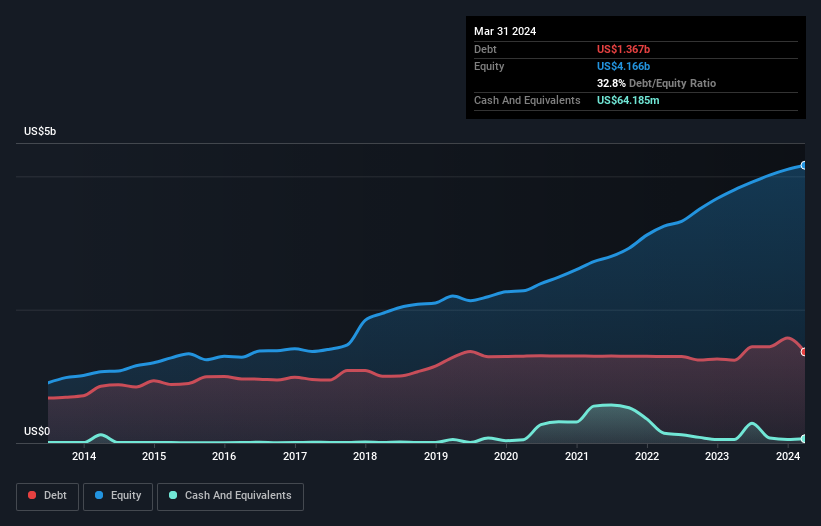- United States
- /
- Transportation
- /
- NasdaqGS:JBHT
These 4 Measures Indicate That J.B. Hunt Transport Services (NASDAQ:JBHT) Is Using Debt Extensively

Warren Buffett famously said, 'Volatility is far from synonymous with risk.' So it seems the smart money knows that debt - which is usually involved in bankruptcies - is a very important factor, when you assess how risky a company is. We can see that J.B. Hunt Transport Services, Inc. (NASDAQ:JBHT) does use debt in its business. But should shareholders be worried about its use of debt?
When Is Debt A Problem?
Debt is a tool to help businesses grow, but if a business is incapable of paying off its lenders, then it exists at their mercy. In the worst case scenario, a company can go bankrupt if it cannot pay its creditors. However, a more common (but still painful) scenario is that it has to raise new equity capital at a low price, thus permanently diluting shareholders. Of course, the upside of debt is that it often represents cheap capital, especially when it replaces dilution in a company with the ability to reinvest at high rates of return. When we think about a company's use of debt, we first look at cash and debt together.
Check out our latest analysis for J.B. Hunt Transport Services
How Much Debt Does J.B. Hunt Transport Services Carry?
The image below, which you can click on for greater detail, shows that at March 2024 J.B. Hunt Transport Services had debt of US$1.37b, up from US$1.24b in one year. However, it also had US$64.2m in cash, and so its net debt is US$1.30b.

How Strong Is J.B. Hunt Transport Services' Balance Sheet?
The latest balance sheet data shows that J.B. Hunt Transport Services had liabilities of US$1.54b due within a year, and liabilities of US$2.72b falling due after that. Offsetting this, it had US$64.2m in cash and US$1.27b in receivables that were due within 12 months. So its liabilities total US$2.93b more than the combination of its cash and short-term receivables.
Since publicly traded J.B. Hunt Transport Services shares are worth a very impressive total of US$17.0b, it seems unlikely that this level of liabilities would be a major threat. But there are sufficient liabilities that we would certainly recommend shareholders continue to monitor the balance sheet, going forward.
We use two main ratios to inform us about debt levels relative to earnings. The first is net debt divided by earnings before interest, tax, depreciation, and amortization (EBITDA), while the second is how many times its earnings before interest and tax (EBIT) covers its interest expense (or its interest cover, for short). The advantage of this approach is that we take into account both the absolute quantum of debt (with net debt to EBITDA) and the actual interest expenses associated with that debt (with its interest cover ratio).
J.B. Hunt Transport Services's net debt is only 0.79 times its EBITDA. And its EBIT easily covers its interest expense, being 15.4 times the size. So we're pretty relaxed about its super-conservative use of debt. The modesty of its debt load may become crucial for J.B. Hunt Transport Services if management cannot prevent a repeat of the 29% cut to EBIT over the last year. When a company sees its earnings tank, it can sometimes find its relationships with its lenders turn sour. There's no doubt that we learn most about debt from the balance sheet. But it is future earnings, more than anything, that will determine J.B. Hunt Transport Services's ability to maintain a healthy balance sheet going forward. So if you're focused on the future you can check out this free report showing analyst profit forecasts.
Finally, while the tax-man may adore accounting profits, lenders only accept cold hard cash. So we clearly need to look at whether that EBIT is leading to corresponding free cash flow. Over the last three years, J.B. Hunt Transport Services reported free cash flow worth 12% of its EBIT, which is really quite low. For us, cash conversion that low sparks a little paranoia about is ability to extinguish debt.
Our View
Neither J.B. Hunt Transport Services's ability to grow its EBIT nor its conversion of EBIT to free cash flow gave us confidence in its ability to take on more debt. But the good news is it seems to be able to cover its interest expense with its EBIT with ease. Looking at all the angles mentioned above, it does seem to us that J.B. Hunt Transport Services is a somewhat risky investment as a result of its debt. That's not necessarily a bad thing, since leverage can boost returns on equity, but it is something to be aware of. The balance sheet is clearly the area to focus on when you are analysing debt. However, not all investment risk resides within the balance sheet - far from it. For instance, we've identified 1 warning sign for J.B. Hunt Transport Services that you should be aware of.
Of course, if you're the type of investor who prefers buying stocks without the burden of debt, then don't hesitate to discover our exclusive list of net cash growth stocks, today.
New: Manage All Your Stock Portfolios in One Place
We've created the ultimate portfolio companion for stock investors, and it's free.
• Connect an unlimited number of Portfolios and see your total in one currency
• Be alerted to new Warning Signs or Risks via email or mobile
• Track the Fair Value of your stocks
Have feedback on this article? Concerned about the content? Get in touch with us directly. Alternatively, email editorial-team (at) simplywallst.com.
This article by Simply Wall St is general in nature. We provide commentary based on historical data and analyst forecasts only using an unbiased methodology and our articles are not intended to be financial advice. It does not constitute a recommendation to buy or sell any stock, and does not take account of your objectives, or your financial situation. We aim to bring you long-term focused analysis driven by fundamental data. Note that our analysis may not factor in the latest price-sensitive company announcements or qualitative material. Simply Wall St has no position in any stocks mentioned.
About NasdaqGS:JBHT
J.B. Hunt Transport Services
Provides surface transportation, delivery, and logistic services in the United States.
Adequate balance sheet average dividend payer.
Similar Companies
Market Insights
Community Narratives



